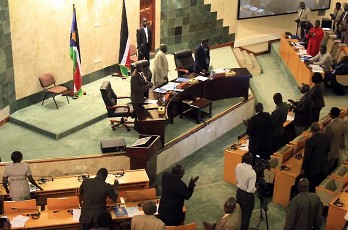S. Sudanese MPs criticise involvement of multi-stakeholders in talks
July 3, 2014 (JUBA) – South Sudanese legislators have criticised the parties involved in peace talks between the government and rebel faction in the Ethiopian capital, Addis Ababa, describing the process as a “conspiracy” to prolong the conflict.

Negotiations, which were being mediated by the Intergovernmental Authority on Development (IGAD) mediated, have now stalled.
To reach a consensus, however, there have been calls for involvement of various stakeholders in the negotiations. A multi-stakeholders conference held in Addis Ababa in May saw the opposition protest the composition of civil society representatives in the process.
“You will not reach an agreement if there are more than two parties at the peace talks,” Gabriel Gut Gut, a member of the United Democratic Front (UDF) party, remarked Wednesday.
Gut, who represents Awiel county in the national assembly, strongly opposed the inclusion of civil society members, church leaders and former political detainees in the ongoing negotiations.
“I read yesterday (Tuesday) in a newspaper that some church pastors are even talking of federalism. They are becoming politicians and forgetting preaching the word of God,” he said, attracting calls for order from Bishop Gabriel Lori, a member of the National Congress Party.
Bishop Lori challenged Gut and demanded that he immediately withdraw his criticism of church leaders.
“Our God is over everything,” said the bishop amid applause from MPs as Gut retracted his earlier remarks.
The national assembly speaker, however, urged the bishop to remind other preachers of their responsibilities.
“They [religious leader] should be confined to gospel work,” said Manasseh Mangok Rundial.
ODD STAKEHOLDERS
Several lawmaker also decried the involvement of many groups at the peace talks, with the assembly deputy speaker saying the strategy adopted for mediation amounted to “regime change”
.
“Any successful peace talks must not interfere with the interim constitution of the country,” said Mark Nyipouc.
The MPs also denounced the presence of numerous stakeholders at the peace talks, with one of them describing the series of tables as “a confusion to continue the fighting” in the country.
However, Bashir Gbandi, the deputy minister of foreign affairs and a government delegate at the talks, told MPs that the question of stakeholders is beyond their jurisdiction.
He said participants to the talks were agreed by President Kiir and Machar in the deal signed on 9 May.
“Unless the heads of states of IGAD-member countries sit again to decide on the stakeholders, we cannot alter the current members of the multi-stakeholders at the peace talks,” said Gbandi.
Gbandi said the government preferred to negotiate with the opposition as the main party to the conflict, something that the latter completely rejected.
IGAD indefinitely suspended the latest round of talks after opposition declined to take part, claiming lack of inclusiveness of civil society representatives from the rebel- controlled areas.
President Kiir recently described as a “red line” any interim government that excludes him as an elected leader.
Minority leader, Andrew Okony from the main opposition SPLM-Democratic Change (SPLM-DC), said he supported the president’s stand.
The parliament, which convened for the first time after resolving the deadlock over appointments of heads of specialised committees, also unanimously passed the president’s speech.
(ST)
